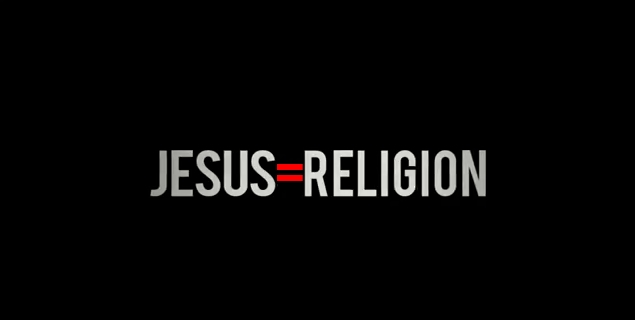In the opening line to his poem Why I Hate Religion, But Love Jesus, Jefferson Bethke says this: “What if I told you Jesus came to abolish religion?” I’m not trying to review a two-year-old video and I’m not trying to take a stab at Mr. Bethke, but his comment and poem articulate a sentiment common and pervasive in Evangelicalism today. Wanting to separate themselves from the empty rituals and meaningless church-going habits of the generation before them, we Evangelicals today flaunt a Christianity that isn’t a “religion” but a “relationship.” T-shirts, books, and 26-million-views YouTube videos all scream one unanimous fact: Evangelicals hate the word “religion.”
But is this hatred valid? Is it even Biblical?
The Websters dictionary defines religion simply as “the belief in a god or in a group of gods; an organized system of beliefs, ceremonies and rules used to worship a god or a group of gods.” Semantically speaking, doesn’t that define Christianity? Now, I get it. Christianity is different from most world religions because it address matters of the heart. The Gospel of Mark tells us that Jesus is primarily concerned with matters of the heart (Mark 12:41-44), and Luke records for us that it is a contrite heart and not our outward acts by which we honor God (Luke 18:8-14). Through the prophet Ezekiel, God says he will replace our heart of stone and instead give us a heart of flesh (Ezekiel 36:26).
But didn’t Jesus himself say that he was “the Way” (John 14:6)? And couldn’t we (loosely) agree that following “the Way” means repentance and faith, a contrite heart, participating in Christ-instituted practices (such as baptism and the Supper, church discipline, etc.), living all of life as worship, belonging to and serving Christ’s church (which brings up another host of issues for evangelicals who want to have Christ without his bride), feasting on the Word, and a Spirit-fueled life of good deeds towards our fellow men?
So…isn’t that religion?
Whereas the Apostle Paul’s primary concern in his letters is often man’s standing before a Righteous God (especially Romans), James’ Epistle is primarily concerned with our standing before our neighbor. One way that is helpful to read the book of James is by asking the question, “In light of Christ’s sacrifice on the cross, how then shall we live?” James’ answer is that the life of a true Christian must be filled with good deeds.
Anticipating the rebellion of 21st century Evangelicals, James writes this:
Religion that is pure and undefiled before God, the Father, is this: to visit orphans and widows in their affliction, and to keep oneself unstained from the world. – James 1:27
James answers the question above with this answer: Jesus FUELS Religion. Jesus is THE Way; He is THE Religion. In light of his substitutionary sacrifice for sinners – standing in our place – and the gift of the Holy Spirit, it is only in Christ that true religion is possible. It is because Christ gives us a new heart that we can participate in true, heart-filled and Spirit-led religion.
Bethke continues in his poem by saying, “Jesus and religion are two different clans.” Evangelicals today want to use the term “religious” to describe hypocritical, judgmental, and non-genuine followers of Jesus. Now I get it, by all means let us separate ourselves from empty, lifeless practices. But that isn’t what “religious” means. The Bible has plenty of other terms to describe those kinds of people (Pharisee, white-washed tomb, brood of vipers, “Be gone I never knew you,” etc.); “religious” isn’t one of them.
I understand what is intended by the phrase “Christianity is a relationship and not religion,” but this is a dishonest quip for us to stand by. We would do well to drop this falsely created idea that Christianity is not religion. Instead, it would be wise to take the time with our neighbor to redefine what makes our religion different from the pantheon of false religions; a gracious and unrelentingly loving God, a perfect and substitutionary Savior who descends from his throne to rescue his people, and an in-dwelling God who by His Spirit fuels our obedience and faith.
Heidelberg Catechism, Question 1.
What is thy only comfort in life and death?
Answer.
That I, with body and soul, both in life and death, am not my own, but belong to my faithful Saviour Jesus Christ, who, with His precious blood, hath fully satisfied for all my sins, and delivered me from all the power of the devil; and so preserves me, that without the will of my heavenly Father, not a hair can fall from my head; yea, that all things must be subservient to my salvation; and therefore, by His Holy Spirit, He also assures me of eternal life, and makes me sincerely willing and ready henceforth to live unto Him.
—–
Revisiting the Screwtape Letters
Instead, in The Screwtape Letters, Lewis is giving us a warning, and doing it in such a way that we can’t easily ignore. He is showing us how prone we are to abandon our Lord—not with big decisions, but through tiny, seemingly insignificant ones. Apostasy isn’t a sudden leap, but “the gentle slope, soft underfoot, without sudden turnings, without milestones, without signposts” (Kindle location 515). This is a reminder, a warning, we need again and again. Let’s pay attention, shall we?
10 Reasons to be a Seminary Professor
8. You will multiply your spiritual influence. A pastor can do a lot of good in his congregation. But if you train pastors, you can do a lot of good in a lot of congregations. From time to time you do hear of your teaching being passed on to bless different congregations.
Prosperity Preaching: Deceitful and Deadly
Luring people to Christ to get rich is both deceitful and deadly. It’s deceitful because when Jesus himself called us, he said things like: “Any one of you who does not renounce all that he has cannot be my disciple” (Luke 14:33). And it’s deadly because the desire to be rich plunges “people into ruin and destruction” (1 Tim. 6:9). So here is my plea to preachers of the gospel.
30 Suggestions for Theological Students and Young Theologians
In response to the question “what advice would you offer to theological students and young theologians as they face a lifetime of theological work?”, John Frame gives the following 30 (!) point answer.
An Extended Debate about the Meaning and the Truth of Calvinism
Although Calvinism is certainly not the dominant theological tradition like it was in the early days of this country, it continues to be a potent strain of religious devotion. Read through the most popular blogs and you’ll see the debate has not died down. When it comes to assessing Geneva, one person’s city on a hill is another person’s pit of hell.
The Distinct, Positive Impact of a Good Dad
The story told by this data, then, suggests that there is a case to make against the fathers who fail to have good-enough relationships with their children. At least on these outcomes, single mothers do about as well for their children, compared to dads who have poor-quality relationships with their children. By contrast, great, and even good-enough dads, appear to make a real difference in their children’s lives.
… is to be tired of life.
This post contains two book excerpts on the seeker-sensitive movement within Evangelicalism. This means it is a slightly longer post; but it is very powerful. I hope you’ll take the time to read both excerpts.
The below excerpt is from the preface of By Faith Alone, edited by Gary Johnson and Guy Waters. This preface was written by David Wells. The second excerpt is from J.I. Packers Evangelism and the Sovereignty of God, who almost speaks prophetically about this movement as it was written in 1961.
This first excerpt is taken in the context of discussing three primary groups within Evangelicalism today. The first is the group which is true to teachings of the Reformation, the second is the “Emergent” group from which the New Paul Perspective and Federal Vision groups stem, which is the focus of this book. The third group (and the largest) is the “seeker-sensitive” group, which has damaged the Protestantism in unfathomable ways. David Wells explains:
—–
In the last few decades, however, a second church constituency has been emerging, first in America, and now, like so many other things American, it is being exported overseas. It is made up of a generation of pragmatists, initially Baby Boomers but now spilling out generationally, who have lived off this reformational understanding as does a parasite off its host, separate but surreptitiously using its life and slowly bringing about the death of its host. These pragmatic entrepreneurs, these salesmen of the gospel, may not always deny reformational understanding overtly, but even if they do not, they always hide it from view. They shuffle off this orthodoxy into a corner where they hope it will not be noticed. To the seekers who are so sensitive and who are their target audience, this orthodoxy would be quite incomprehensible, not to say off-putting. So, it is covered up because it is judged to be irrelevant to what is of interest to them and tho those who are in the business of selling Christianity; it is likewise judged to be irrelevant to their work.
They want to reconfigure their churches around the marketing dynamic, and this is something quite different. It is this experiment of borrowing off the mechanisms of capitalism, this skimming off of business savvy and the niche-marketing that follows, that makes up the second major constituency in evangelical faith, as I see it.
…In fact, it is the dominant constituency in American evangelicalism today, which is why it is pandered to so shamelessly by Christianity Today. And that is also why it passes unchallenged by many evangelical leaders who might know better. Its stunning success has placed it beyond accountability or criticism. Its success has made it invulnerable and impervious.
The idea at the heart of this experiment was always rather simple. If Coca-Cola can sell its drinks, if Lexus can market its cars, why can’t the church, using the same principles, the very same techniques, market its message? After all, this is the language that all Americans understand because all Americans are consumers. And so it was that the seeker-sensitive church emerged, reconfigured around the consumer, edges softened by marketing wisdom, pastors driven by business savvy, selling, always selling, but selling softly, alluringly, selling the benefits of the gospel while most, if not all, of the costs were hidden. Indeed, it got worse than this. Sometimes what was peddled was a gospel entirely without cost, to us and apparently also to Christ, a gospel whose grace is therefore so very cheap. And it has gotten even worse. Just as often, the gospel has vanished entirely and been replaced only by feel-good therapy. The message has been about a God without wrath, bringing man without sin, into a kingdom without a judgement, through a Christ without a cross…all that we might feel good about ourselves and come back to “church” next week. This, actually, is how Niebuhr described the old, defunct Liberal gospel! But, never mind. Buoyed by George Barna’s statistics and flushed with success, seeker-sensitive pastors have sallied forth into the consumer fields in ever more inventive and extraordinary ways to bring in the harvest now ripened, now ready to be gathered and fetched into their auditoriums.
But to what are these seekers coming? Gone are all the signs of an older Christianity. Churches that once looked like churches, symbols of a message transcendent in origin, have now been replaced by auditoriums, and some of them might even be mistake as business convention centers. Indeed, they might even pass as showrooms – boats and home appliances on display during the week and Jesus on the weekend. And why not? Gone, after all, is the transcendent message, and what remains, really, is quite-this-worldy. And this is subtly broadcast visually. Pews have been replaced by chairs, the pulpit by a stage, or, maybe, a plexiglass stand, the Scripture reading by a drama group, the choir by a set of sleek and writhing singers who could be straight out of a show in Vegas, and everywhere the Jumbotrons, the technology, the wizardry of a control so complete that it all comes off as being super-casual. This church stuff is no sweat; it’s fun! It is to this that seekers are coming. Indeed, far more frequently than we might wish to know, it is only to this that they are coming.
Barna, at least, is now dismayed. His assiduous polling, which initially launched this experiment in “how to do church,” has now been following behind it and churning up some truly alarming findings. You see, none of this pizzazz and glitz has made an iota of difference to those who have been attending. They have been living on our postmodern “bread,” on technology and entertainment alone, and not on the Word of God. The result is that they are now living no differently from those who are overtly secular, he says. They have no Christian worldview, they exhibit no Christian character, and they show no Christian commitment. Their pastors, he says, measure their own success by the number of attendees and the square footage of the building, but the people who attend, those who are born again, show none of the signs of the radical discipleship that Jesus demanded. Am I just old-fashioned when I wonder to myself where there might be a causal connection between this flagging discipleship and the abandoned biblical concerns about truth, the irrelevant orthodoxy, in these seeker-sensitive churches?
—–
Now, a word from J.I. Packer:
There is today a controversy in some evangelical circles about evangelistic methods. Some are criticizing, and others are defending, the type of evangelistic meeting that has been a standard feature of English and American evangelical life for almost a century. Meetings of this type are well known, for they are very characteristic. They are deliberately made brisk and bright, in the hope that people who have little interest in the Christian message, and who may never have been inside a Christian church, may nevertheless find them an attraction. Everything is accordingly planned to create and atmosphere of warmth, good humor and happiness. The meeting normally includes a good deal of music – choir items, solo items, choruses and rousing hymns, heartily sung. Heavy emphasis is laid on the realities of Christian experience, both by the choice of hymns and by the use of testimonies. The meeting leads up to an appeal for decision, followed by an after-meeting or a time of personal counseling for the further instruction of those who have made, or wish to make, a decision in response to the appeal.
The main criticisms that are made of such meetings – whether they are wholly justified we would not venture to say – are as follows. Their breezy slickness makes for irreverence. The attempt to give them “entertainment value” tends to lessen the sense of God’s majesty, to banish the spirit of worship and to cheapen men’s thoughts of their Creator; moreover, it is the worst possible preparation of the potential converts for the regular Sunday services in the churches which they will in due course join. The seemingly inevitable glamorizing of Christian experience in the testimonies is pastorally irresponsible and gives a falsely romanticized impression of what being a Christian is like. This, together with the tendency to indulge in long, drawn-out wheedling for decisions and the deliberate use of luscious music to stir sentiment, tends to produce “conversions” which are simply psychological and emotional upheavals, and not the fruit of spiritual conviction and renewal at all. The occasional character of the meetings makes it inevitable that appeals for decision will often be made on the basis of inadequate instruction as to what the decision involves and will cost, and such appeals are no better than a confidence trick. The desire to justify the meetings by reaping a crop of converts may prompt the preacher and the counselors to try and force people through the motions of decision prematurely, before they have grasped with is really all about, and converts produced in this way tend to prove at best stunted and at worst spurious and, in the event, gospel-hardened.
The way ahead in evangelism, it is said, is to break completely with this pattern of evangelistic action, and to develop a new pattern (or rather, restore the old one which existed before this type of meeting became standard), in which the evangelizing unit is the local church rather than a group or cross-section of churches. Then the evangelistic meeting finds its place among the local church’s services – a pattern, indeed, in which the local church’s services function continually as its evangelistic meetings.
December 10, 1784, in a recorded conversation between Charles Simeon and John Wesley:
CS: Sir, I understand that you are called an Arminian, and I have been sometimes called a Calvinist and therefore I suppose we are to draw daggers. But before I consent to begin the combat, with your permission I will ask you a few questions…Pray, Sir, do you feel yourself a depraved creature, so depraved that you would never have thought of turning to God, if God had not first put it into your heart?
JW: Yes, I do indeed.
CS: And do you utterly despair of recommending yourself to God by anything you can do; and look for salvation solely through the blood and righteousness of Christ?
JW: Yes, solely through Christ.
CS: But, Sir, supposing you were at first saved by Christ, are you not somehow or other to save yourself afterwards by your own works?
JW: Now, I must be saved by Christ from first to last.
CS: Allowing, then, that you were first turned by the grace of God, are you not in some way or other to keep yourself by your own power?
JW: No.
CS: What, then, are you to be upheld every hour and every moment by God, as much as an infant in its mother’s arms?
JW: Yes, altogether.
CS: And is all your hope in the grace and mercy of God to preserve you unto his heavenly kingdom?
JW: Yes, I have no hope but in him.
CS: Then, Sir, with your leave I will put up my dagger again; for this is all my Calvinism; this is my election, my justification by faith, my final perseverance: it is in substance all that I hold, and as I hold it; and therefore, if you please, instead of searching out terms and phrases to be a ground of contention between us, we will cordially unite in those things wherein we agree.



